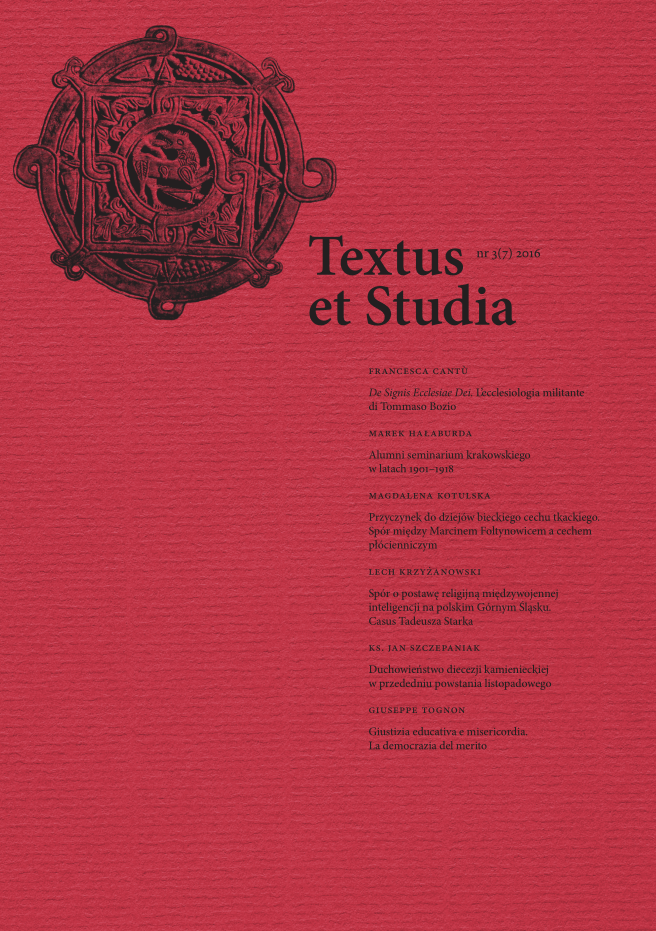Giustizia educativa e misericordia. La democrazia del merito
DOI:
https://doi.org/10.15633/tes.02306Słowa kluczowe:
sprawiedliwość, demokracja, wychowanie, zasługa, merytokracja, Kościół, społeczeństwo, nowy humanizmAbstrakt
For the first time, many decades after World War II or at least after the fall of the Berlin wall, the matter of democracy received traits of an anthropological and bringing up matter. It is conductive to carry out a full-scale and sincere analysis concerning its aims. The upbringing of the human kind which was a great theme of the seventeenth-century education, becomes a challenge which concerns the foundation of the humanity and asks consciences. The use of education as the factor of the social discrimination made a stand to all revolutions of modern times, and even became a decisive element in the process of secularizing of a society. Beginning from the XVII century rulers and countries, took the place of the Church. In reality, the Churched had the monopoly over education till that time, and in a special way of the high intellectual formation.
It is not accidental that the Catholic Church is calling for new humanism today. The humanism which would be able to free man from increase of false humanistic ideology. The Catholic Church is able to face, using also scientific knowledge, the problem of human existence and defence creation. Today Christians should testify, individually and together, that the Church has reached new consciousness when it comes to the value of democracy in the areas which concern creating of people and their critical spirit, and also their abilities to cling to Gospel always in a new way, and with relation to cultures and values which are often opposed to each other. “Meritocracy” as a social temptation is radically different from the democracy of the merit which aims is to build the idea of life. The idea is worth living for because it is democratic.
Bibliografia
Barone C., Le trappole della meritocrazia, Bologna 2012.
Becker G., Human Capital, New York 1964.
Berlin I., A Message to the Twenty-First Century, London 2014.
Berlin I., The Pursuit of the Ideal [in:] The Crooked Timber of Humanity, London 1988.
Bowen W.G., Kurzweil M.A., Tobin E.M., Equity and Excellence in American Education, Charlottesville 2006.
De Giorgi F., L’istruzione per tutti. Storia della scuola come bene comune, Brescia 2010.
De Ketelle J.-M., Hugonnier B., Parmentier P., Cosnefroy L., Quelle excellence pour l’enseignement supérieur?, Bruxelles 2012.
Dubet F., Sentiments et jugements de justice dans l’expérience scolaire [in:] D. Meuret (ed.), La justice du système éducatif, Bruxelles 1999. Meuret D., La justice du système éducatif, Bruxelles 1999.
Nussbaum M., Not For Profit: Why Democracy Needs the Humanities, Princeton 2010.
OECD, Education at Glance. OECD Indicators, Paris 2016.
Piketty T., Le capital au XXI siècle, Paris 2013.
Rawls J., A Theorie of Justice, Oxford 1987.
Rawls J., Una teoria della giustizia, Milano 1971.
Schizzerotto A., Trivellato U., Sartor N., Generazioni diseguali, Bologna 2010.
Sen A., The Idea of Justice, London 2010.
Stein Z., Social Justice and Educational Measurement: John Rawls, the History of Testing and the Future of Education, New York 2016.
Tognon G., Intégration, intégralité, intégrité. Réflexions historiques et philosophiques sur un lexique pédagogique de la modernité, «Transversalités» 2017, n. 141.
Tognon G., La démocratie du mérite, tr. di Ch. Carraud, Paris 2016.
Tognon G., La democrazia del merito, Roma 2016.
Unesco, Rapport mondial du suivi sur l’éducation pour tous, Paris 2015.
Weil S., Autobiographie spirituelle, Marseille, 14 Mai 1942 [in:] S. Weil, Œuvres, édition établie sous la direction de Florence de Lussy, Paris 1999.
Pobrania
Opublikowane
Numer
Dział
Licencja
Prawa autorskie (c) 2017 Giuseppe Tognon

Praca jest udostępniana na licencji Creative Commons Attribution-NonCommercial-NoDerivatives 3.0 Unported License.
Autorzy publikujący w czasopiśmie udzielają jego wydawcy zgody o następującej treści:
- Autor zachowuje autorskie prawa majątkowe do utworu, a jednocześnie udziela wydawcy czasopisma zgody na jego pierwszą publikację w wersji drukowanej i wersji online na licencji Creative Commons Uznanie autorstwa 4.0 Międzynarodowe oraz zgody na wykonywanie opracowań, w tym przekładów.
- Autor ma możliwość udzielania zgody niewyłącznej na opublikowanie utworu w wersji, która ukazała się w czasopiśmie (np. zamieszczenia go w repozytorium instytucjonalnym lub opublikowania w książce), wraz z informacją o jego pierwszej publikacji w czasopiśmie.
- Autor może umieścić swój utwór online (np. w repozytorium instytucjonalnym lub na swojej stronie internetowej) jeszcze przed zgłoszeniem utworu do czasopisma.

